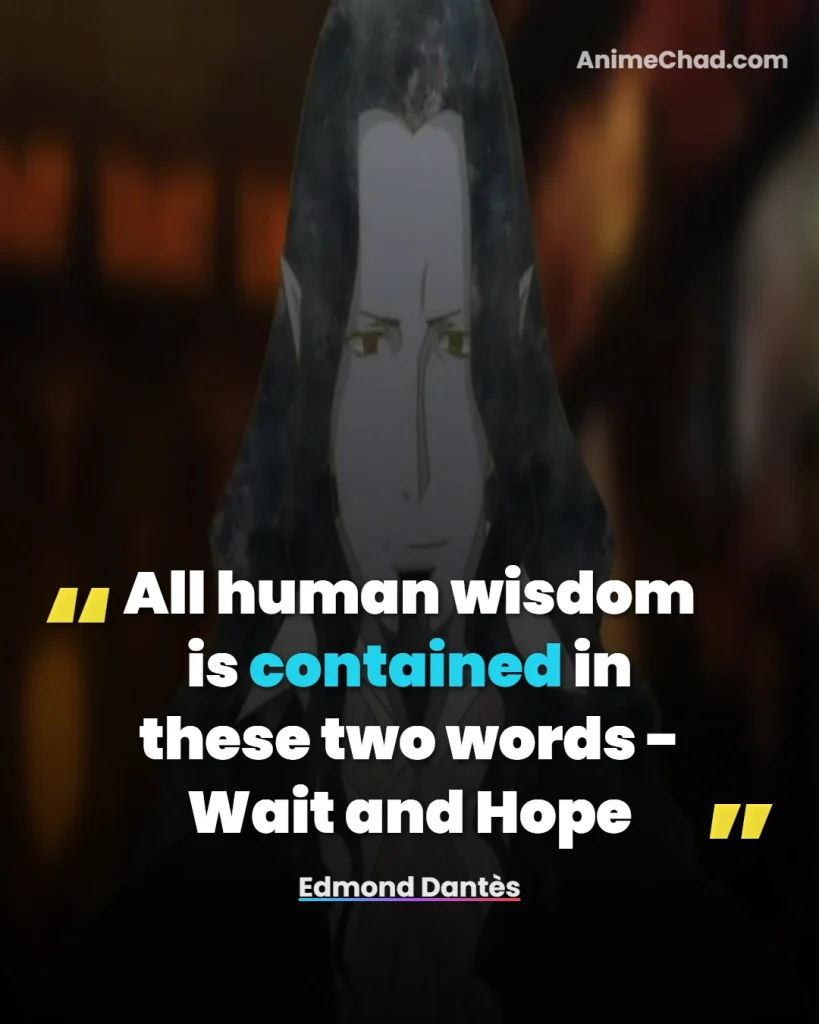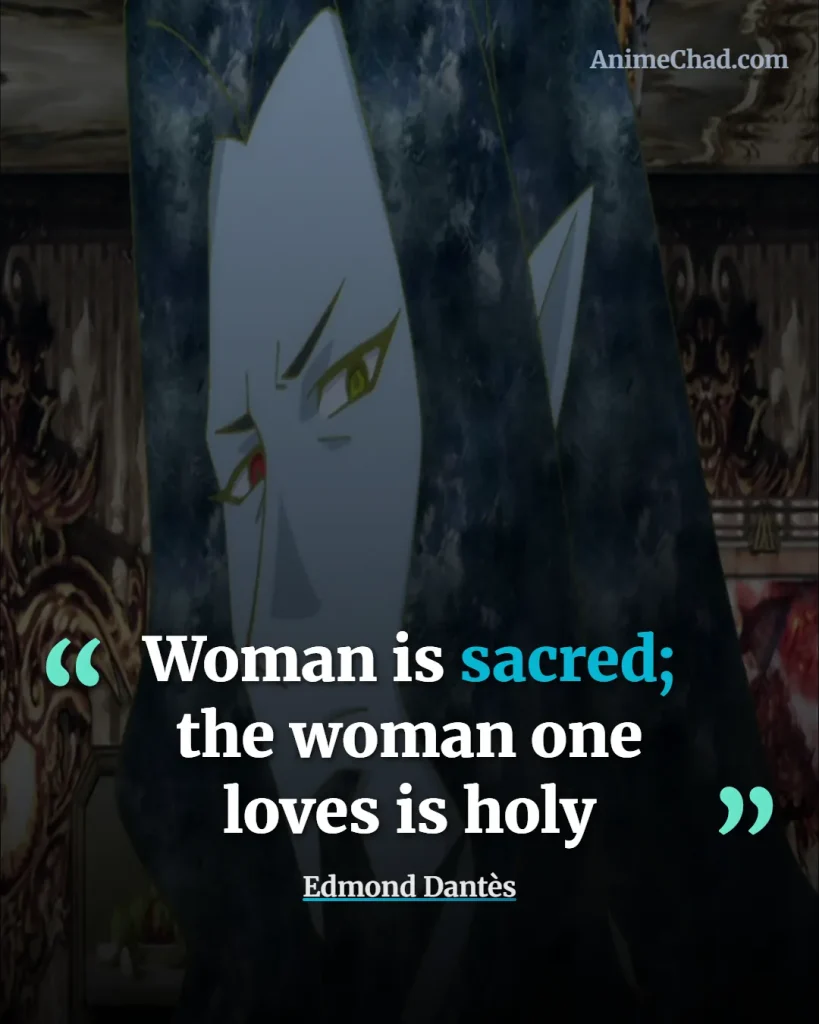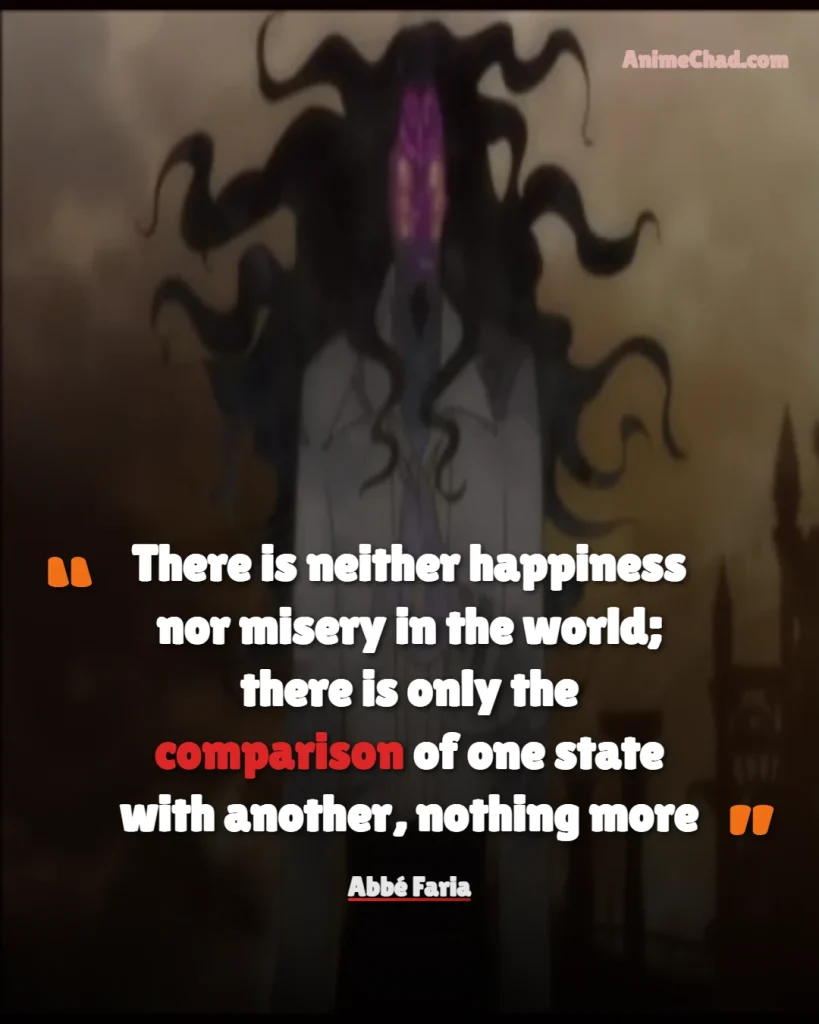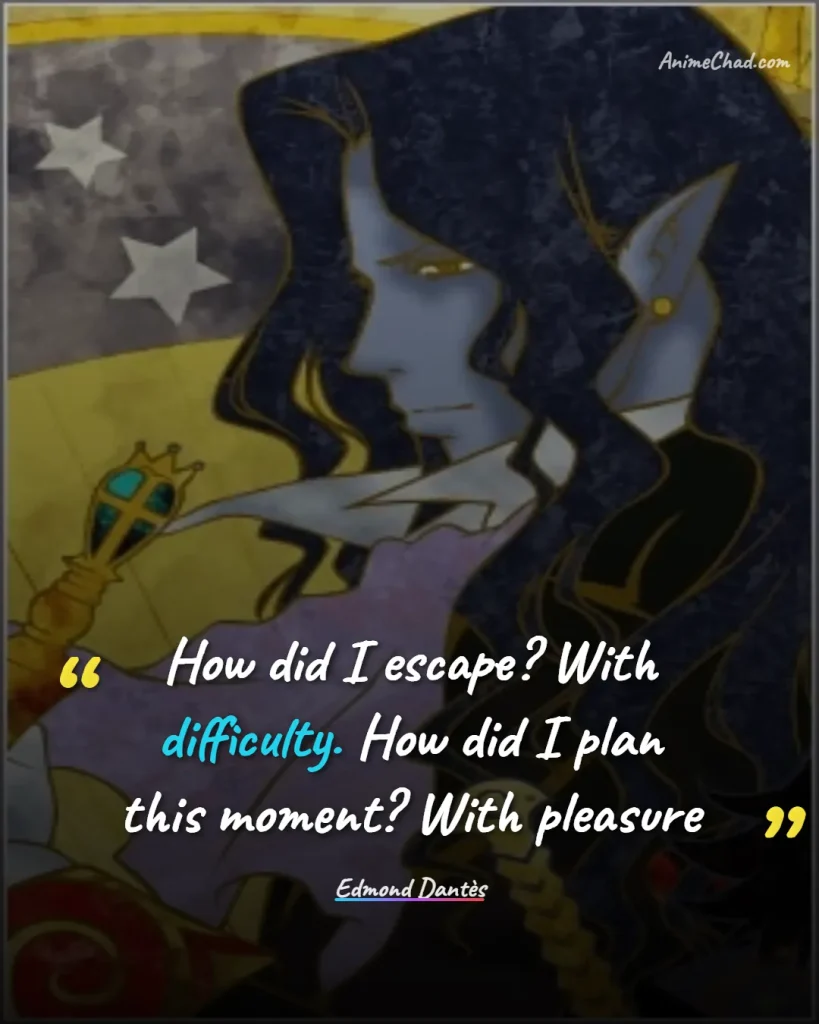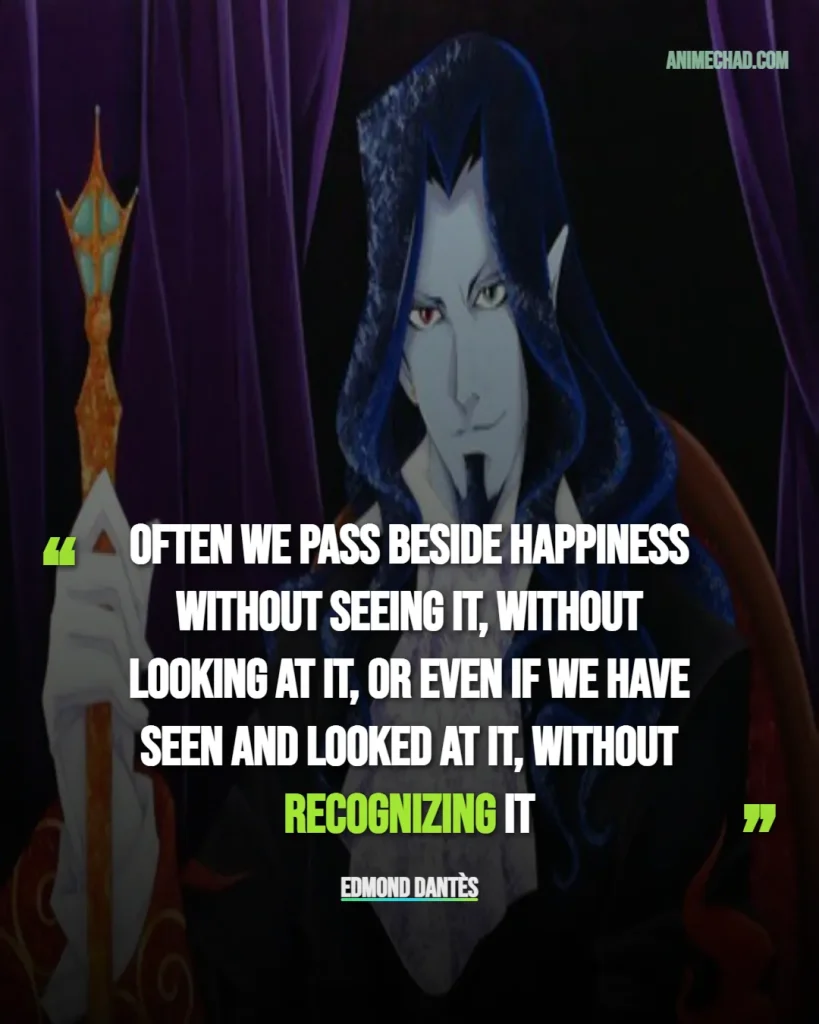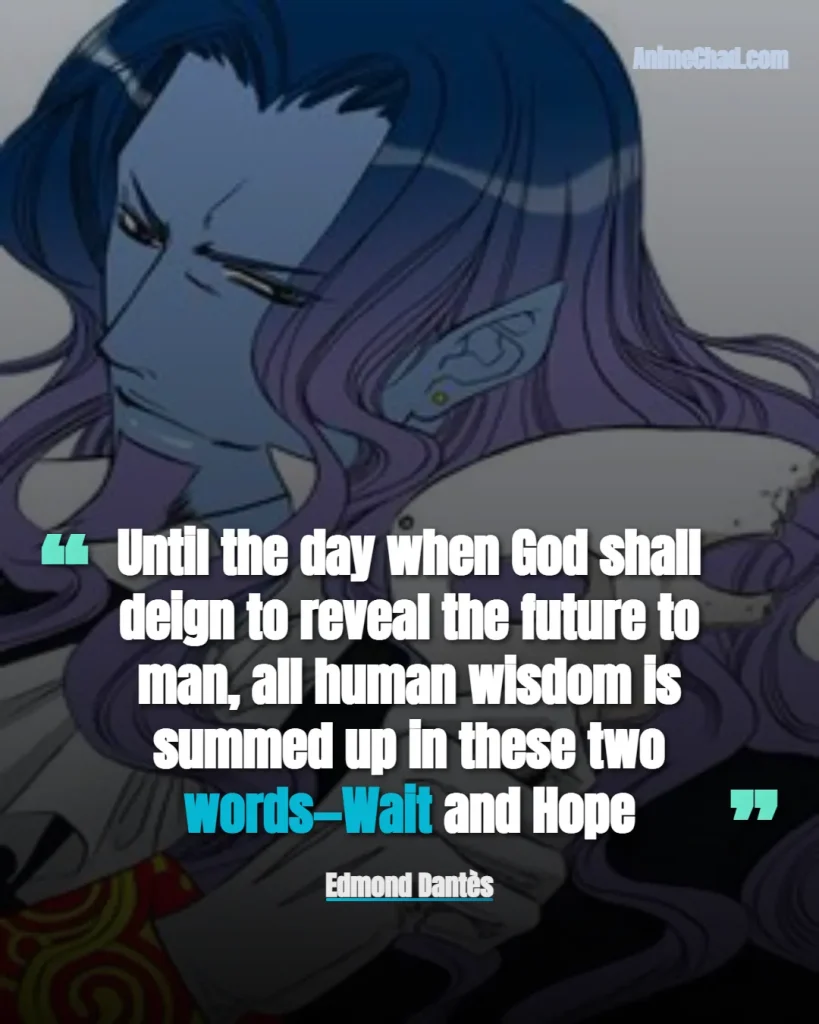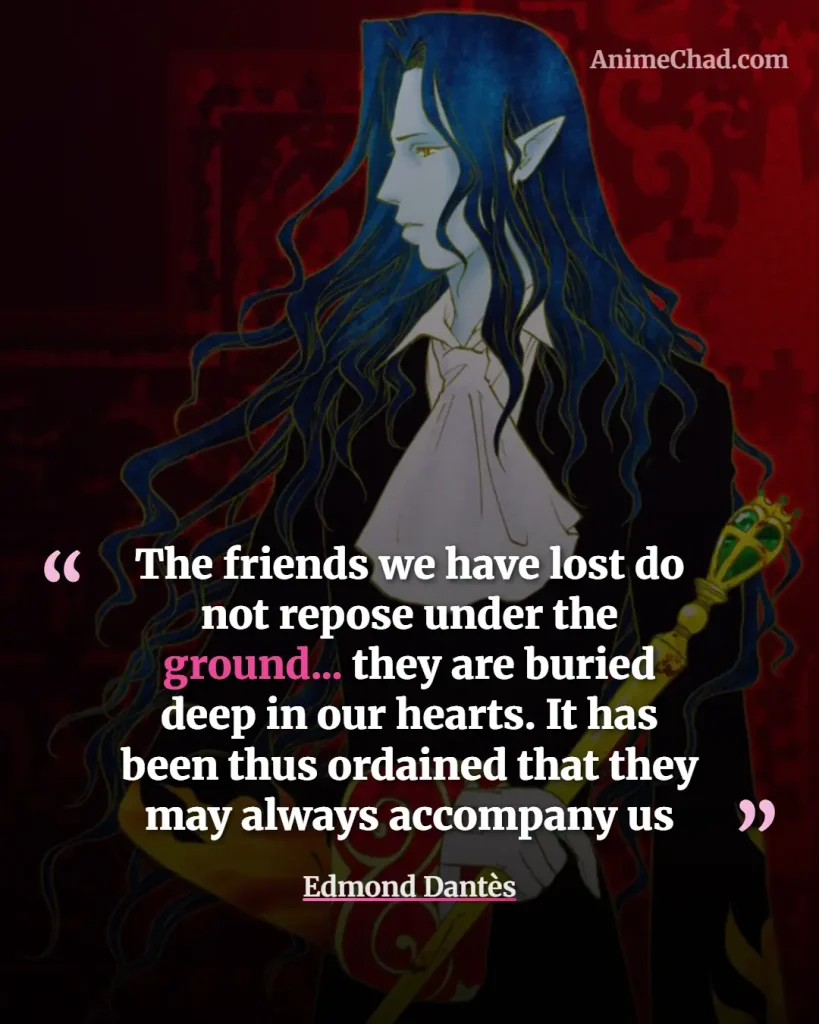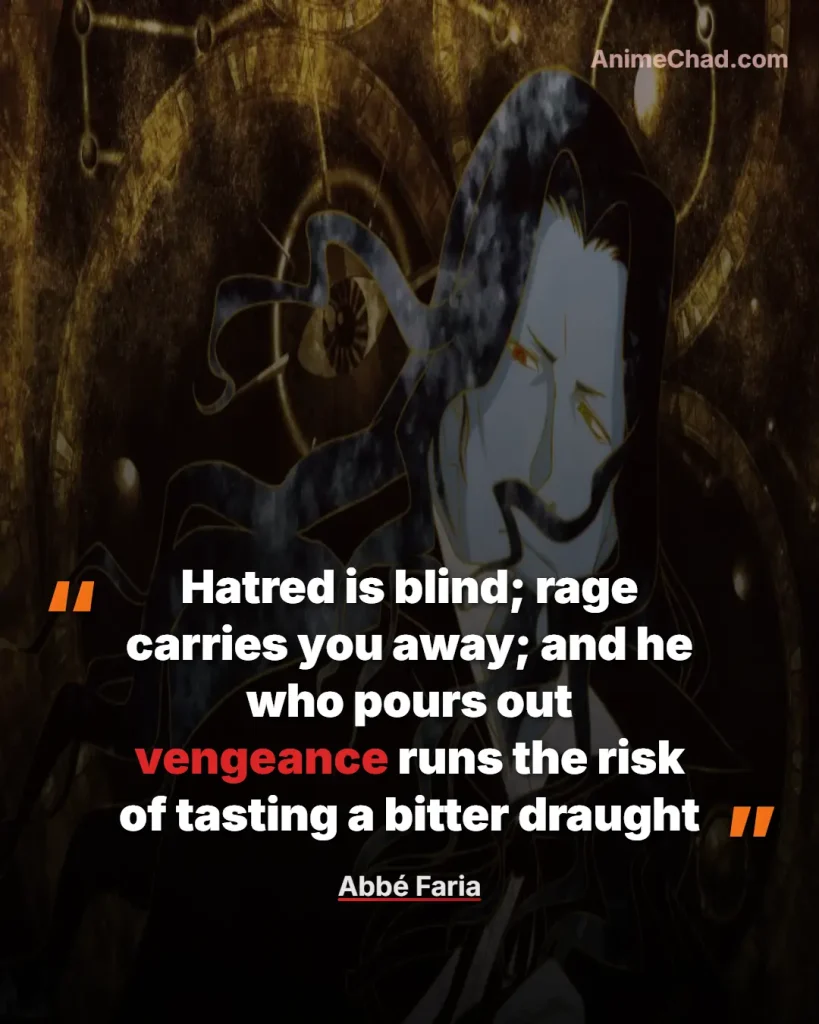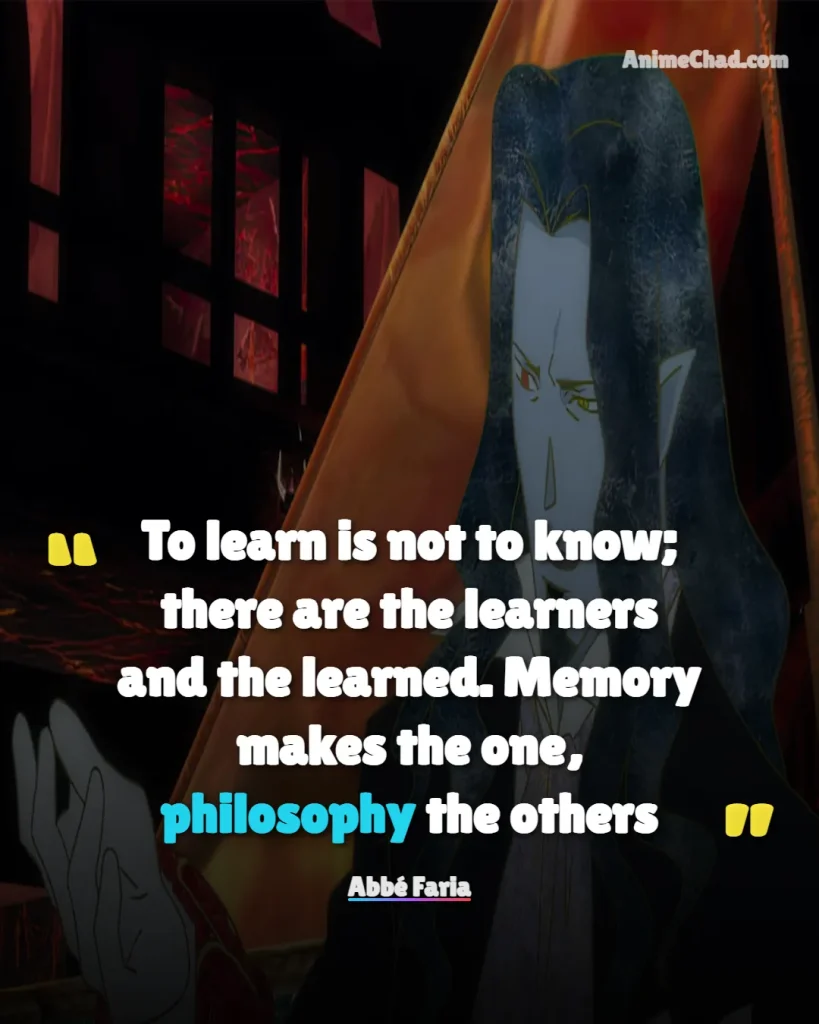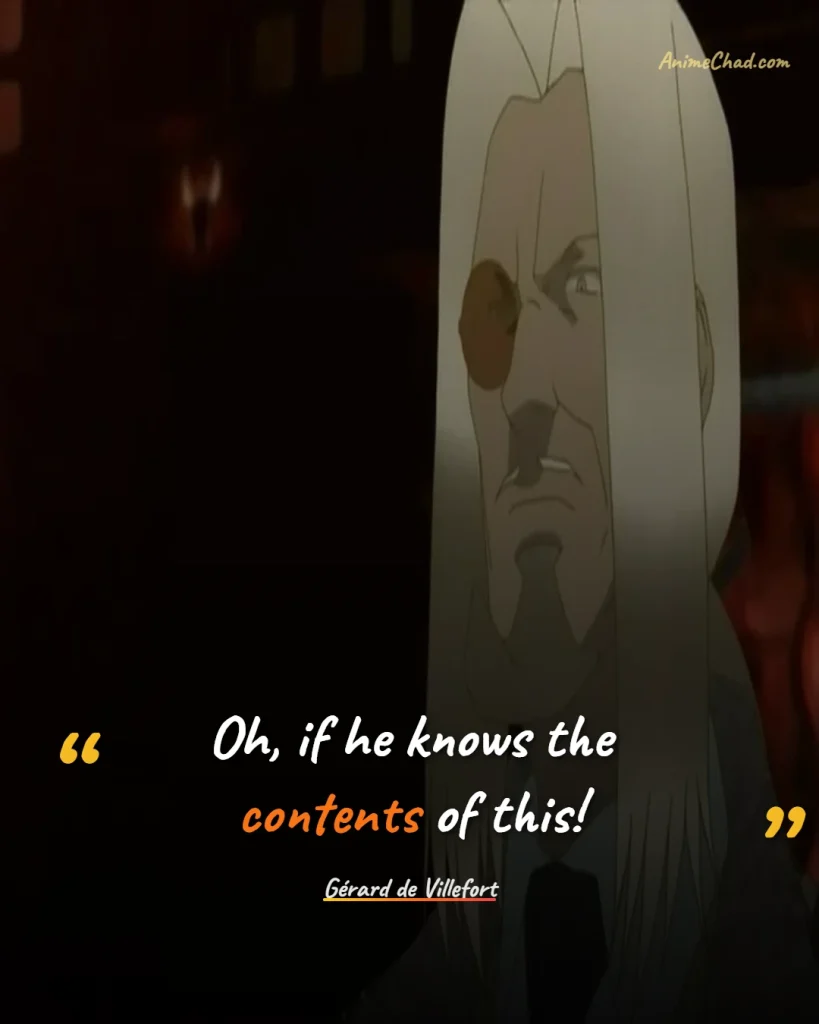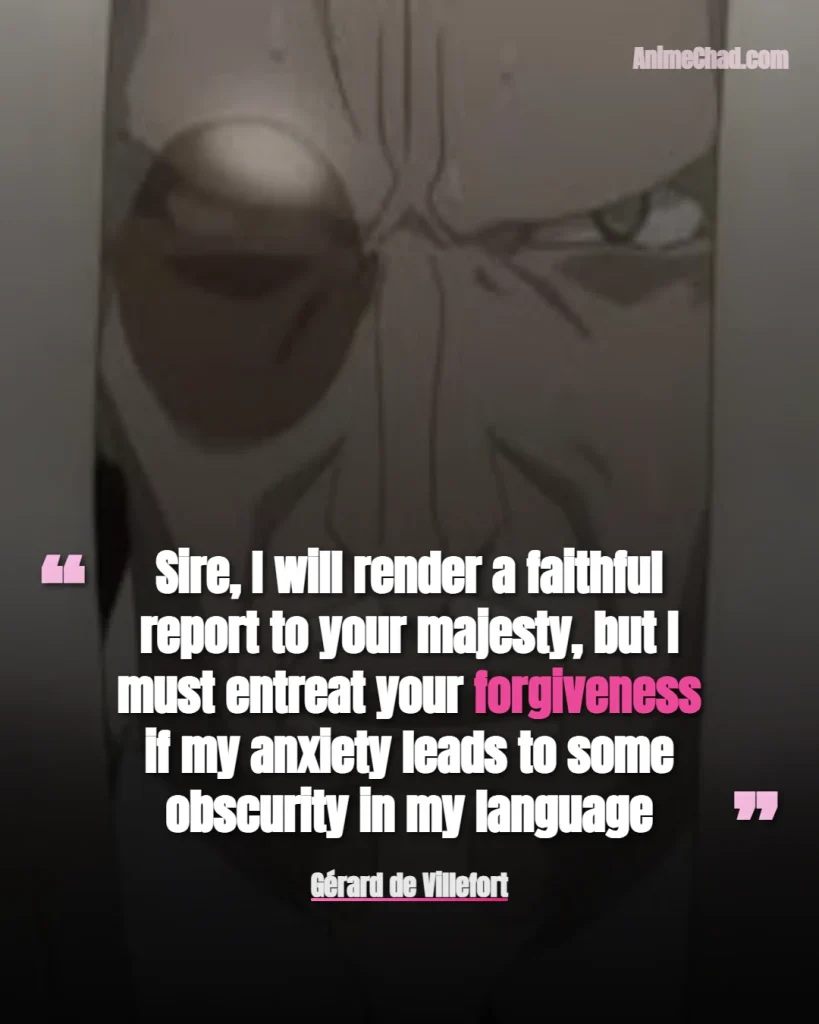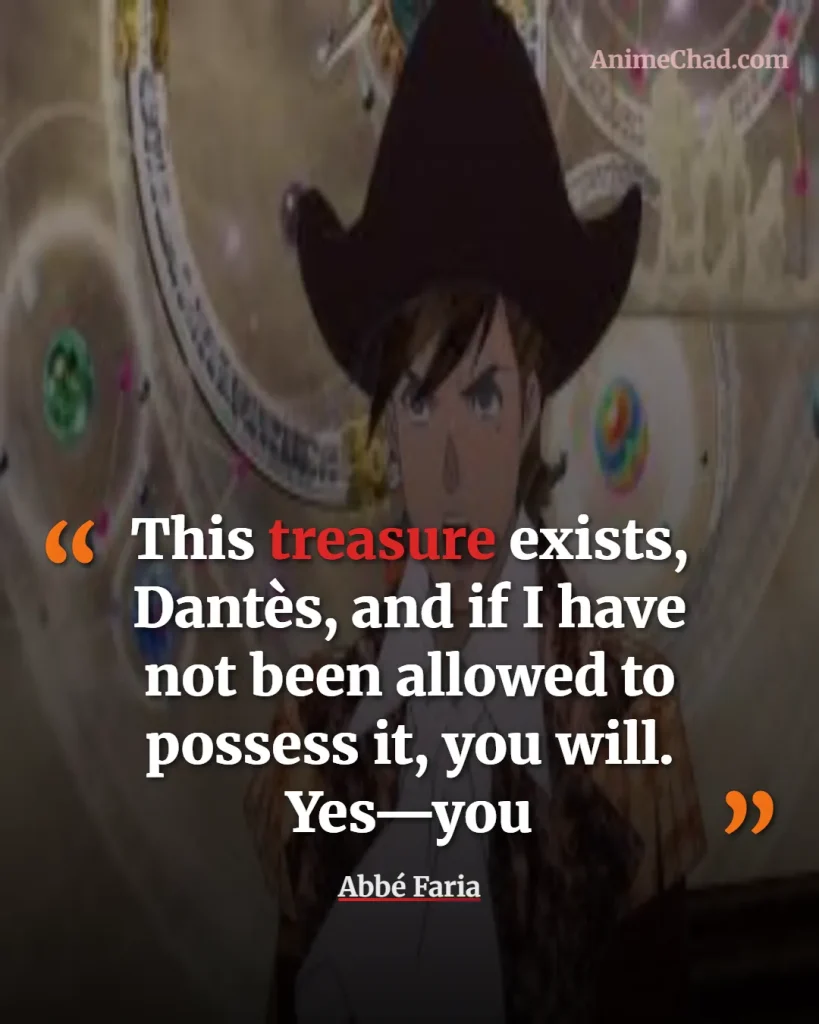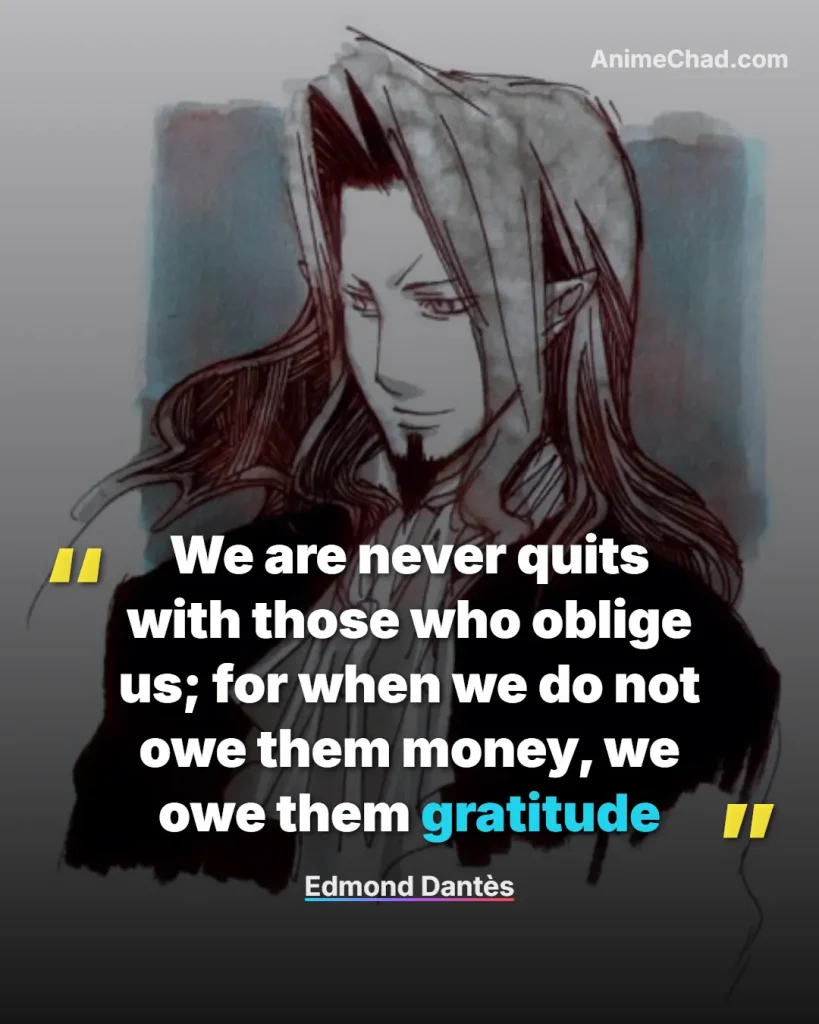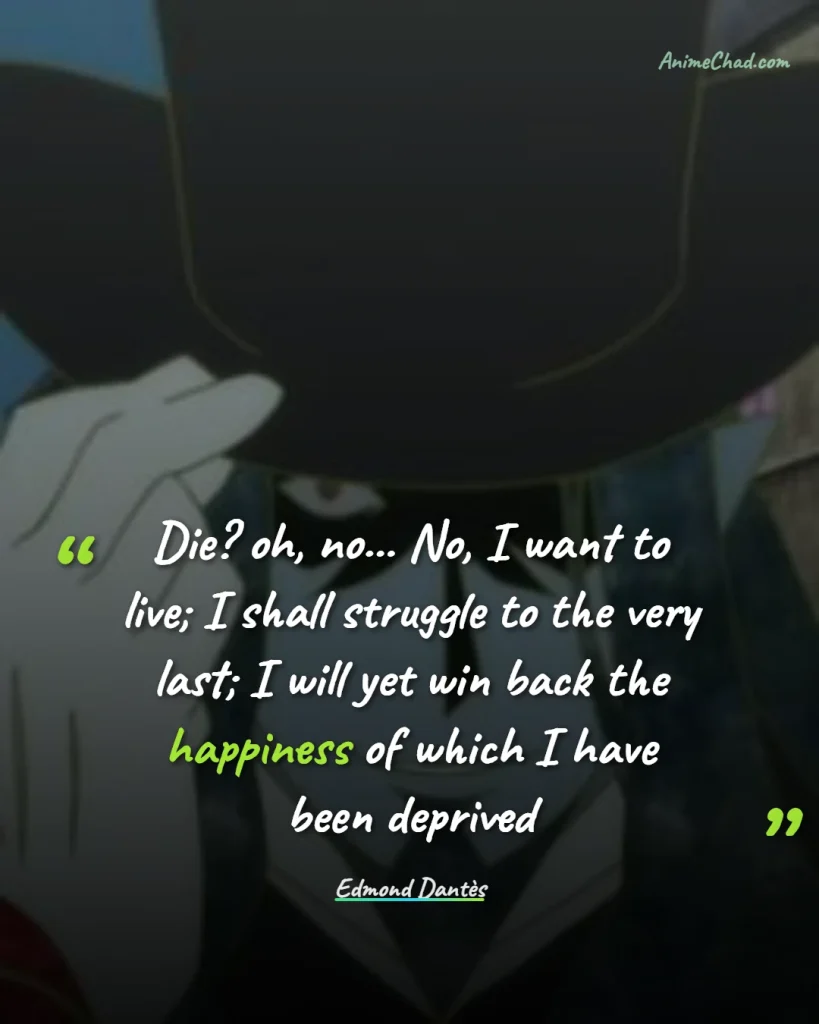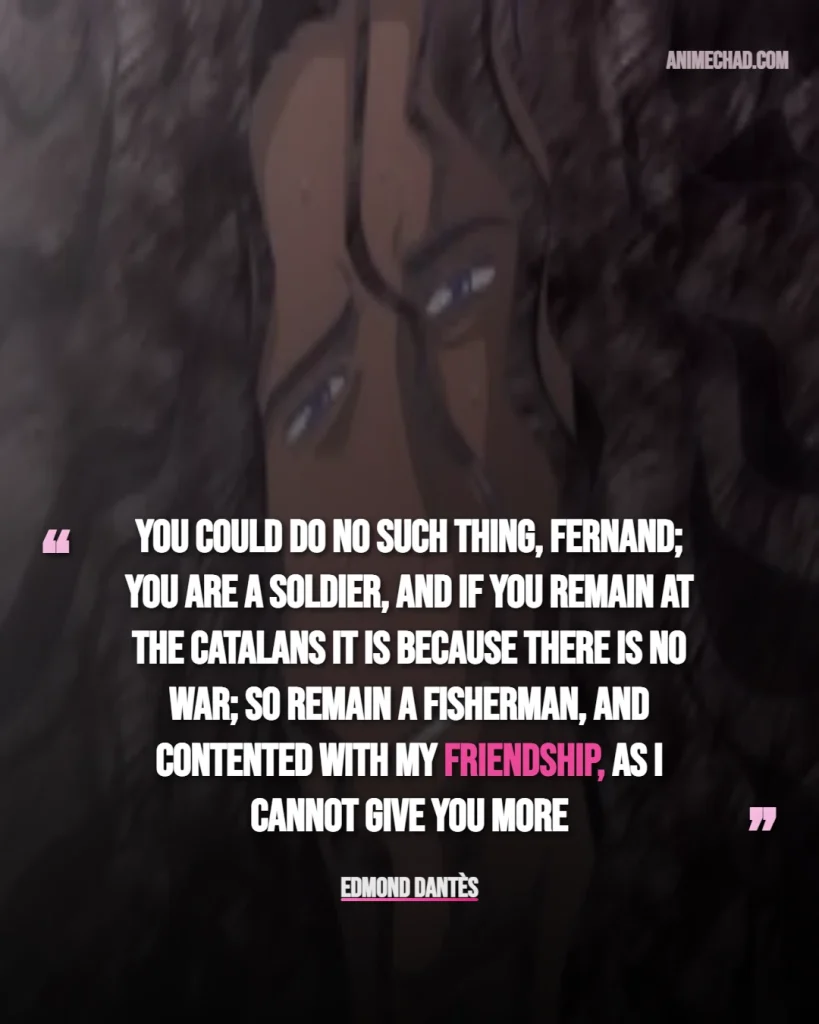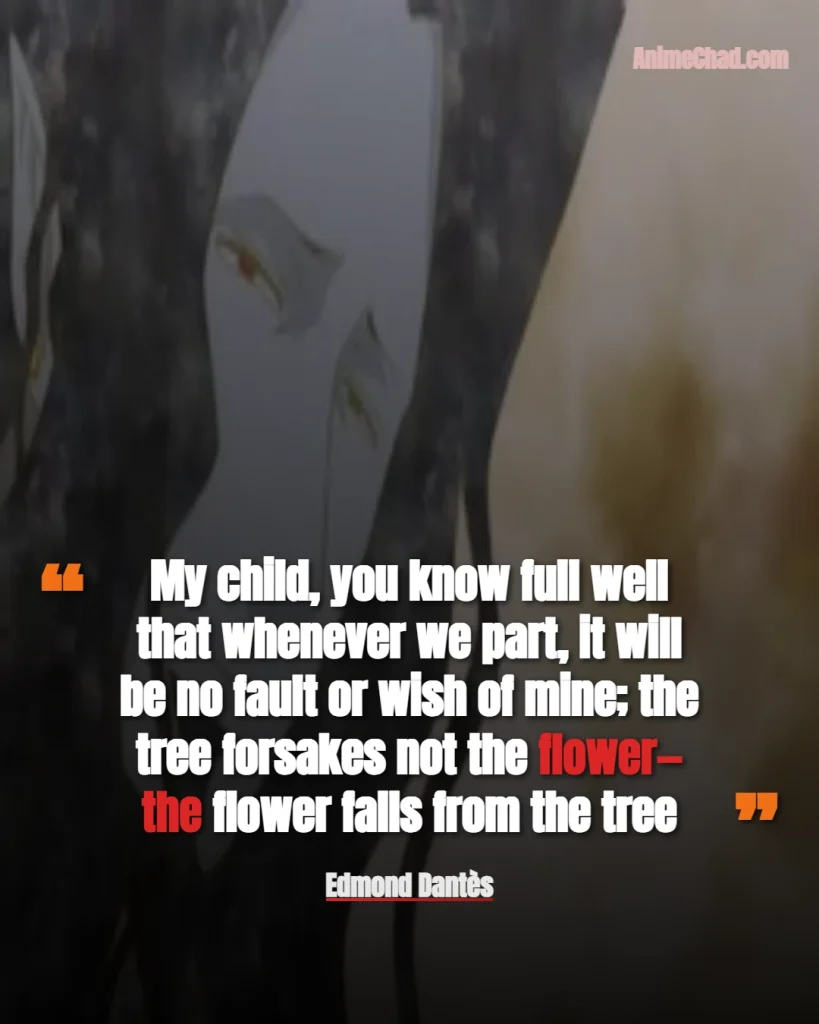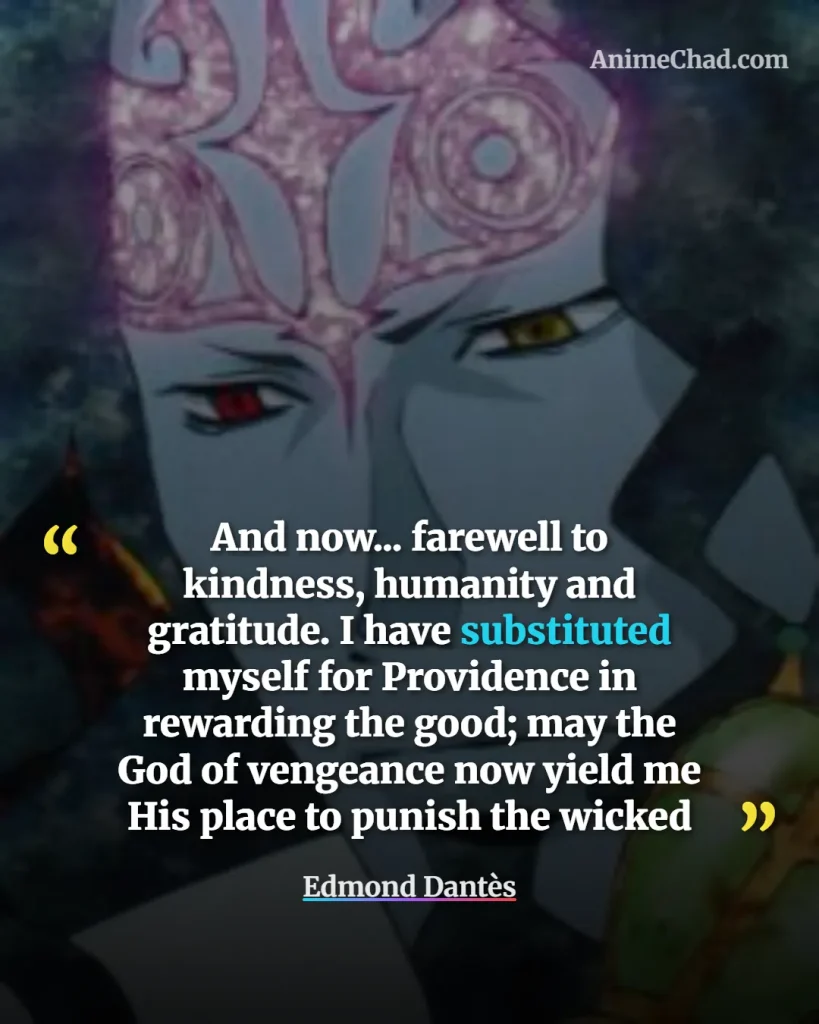The Count of Monte Cristo follows Edmond Dantès, a young sailor unjustly imprisoned who transforms into the enigmatic Count, orchestrating revenge against those who betrayed him. The novel delves into profound themes of justice, redemption, the inexorability of fate, and the duality of vengeance and mercy.
This curated collection of 25 quotes highlights pivotal moments across the story’s arcs, illustrating Dantès’s evolution from innocence to calculated retribution while balancing intense confrontations with reflective interludes.
All human wisdom is contained in these two words – Wait and Hope
Chapter 117 (The Insult)
Edmond Dantès (as the Count of Monte Cristo)
Closing wisdom to a despairing friend, encapsulating resilience and patience as antidotes to suffering, tying into the theme of enduring fate’s trials for eventual redemption.
Life is a storm, my young friend. You will bask in the sunlight one moment, be shattered on the rocks the next. What makes you a man is what you do when that storm comes
Chapter 77 (Haidee)
Edmond Dantès (as the Count of Monte Cristo)
Mentoring Albert during a crisis of honor, this reveals Dantès’s hardened worldview from imprisonment, emphasizing courage amid chaos and character forged through adversity.
I am not proud, but I am happy; and happiness blinds, I think, more than pride
Chapter 39 (The Guests)
Edmond Dantès (as the Count of Monte Cristo)
In a lavish dinner, Dantès reflects on his disguised joy, showing his internal conflict between feigned detachment and genuine elation, underscoring themes of illusion versus true fulfillment.
Woman is sacred; the woman one loves is holy
Chapter 77 (Haidee)
Edmond Dantès (as the Count of Monte Cristo)
Defending Haydée’s testimony, this idealizes pure love as untouchable, marking Dantès’s growth from romantic youth to protector, connecting to redemption through protective mercy.
It’s necessary to have wished for death in order to know how good it is to live
Chapter 15 (Number 34 and Number 27)
Edmond Dantès
Shared with Abbé Faria in prison isolation, this captures the emotional rebirth from suicidal despair to renewed purpose, highlighting survival’s value and the theme of fate’s transformative cruelty.
There is neither happiness nor misery in the world; there is only the comparison of one state with another, nothing more
Chapter 63 (The Dinner)
Abbé Faria (recalling to Dantès)
Instructing Dantès on perspective during escape planning, this philosophical insight fosters his intellectual evolution, linking relativity of joy to the pursuit of justice over blind emotion.
How did I escape? With difficulty. How did I plan this moment? With pleasure
Chapter 88 (The Insult)
Edmond Dantès (as the Count of Monte Cristo)
Confronting de Villefort subtly at a social event, this terse revelation signals the arc of revenge’s culmination, showing Dantès’s calculated satisfaction and the weight of long-buried rage.
Fool that I am, that I did not tear out my heart the day I resolved to revenge myself
Chapter 93 (Valentine de Villefort)
Edmond Dantès (as the Count of Monte Cristo)
In a moment of private remorse amid poisoning schemes, this exposes Dantès’s internal torment, developing his arc from vengeful force to one questioning retribution’s cost to humanity.
Often we pass beside happiness without seeing it, without looking at it, or even if we have seen and looked at it, without recognizing it
Chapter 77 (Haidee)
Edmond Dantès (as the Count of Monte Cristo)
Advising during a tense alliance with Albert, this reflects on lost innocence pre-betrayal, tying to themes of fate’s irony and the emotional blindness revenge imposes on life’s simpler joys.
Until the day when God shall deign to reveal the future to man, all human wisdom is summed up in these two words—Wait and Hope
Chapter 117 (The Insult)
Edmond Dantès (as the Count of Monte Cristo)
Final counsel to Maximilien before departure, this reinforces hope as redemption’s anchor, showing Dantès’s full character arc from prisoner to enlightened guide beyond vengeance.
The friends we have lost do not repose under the ground… they are buried deep in our hearts. It has been thus ordained that they may always accompany us
Chapter 112 (The Departure for Belgium)
Edmond Dantès (as the Count of Monte Cristo)
Comforting in grief over lost loved ones, this peaceful reflection honors enduring bonds, contrasting vengeful arcs with themes of memory’s solace and emotional healing.
Hatred is blind; rage carries you away; and he who pours out vengeance runs the risk of tasting a bitter draught
Chapter 77 (Haidee)
Abbé Faria (echoed by Dantès)
Warning during revenge plotting, this cautions against unchecked fury, pivotal to Dantès’s development as he balances rage with wisdom, central to justice tempered by mercy.
To learn is not to know; there are the learners and the learned. Memory makes the one, philosophy the others
Chapter 19 (The Third Attack)
Abbé Faria
In a quiet prison tutorial, this distinguishes rote survival from enlightened revenge, marking Dantès’s transformation from sailor to strategist through intellectual rebirth.
Oh, if he knows the contents of this!
Chapter 7 (The Examination)
Gérard de Villefort
Panic upon reading Dantès’s letter in his office, this exposes ambition’s moral fracture, foreshadowing the betrayal arc and themes of corruption eroding personal integrity.
Before Mercédès should die, I would die myself!
Chapter 5 (The Marriage-Feast)
Fernand Mondego
Vowing protection in a jealous lovers’ clash, this raw passion reveals Fernand’s initial devotion turning toxic, highlighting fate’s role in twisting love into betrayal.
I love Edmond Dantès… and none but Edmond shall ever be my husband
Chapter 2 (Father and Son)
Mercédès Herrera
Declaring fidelity amid village tensions, this serene moment underscores pure love’s endurance, contrasting peaceful origins with the storm of impending injustice.
Sire, I will render a faithful report to your majesty, but I must entreat your forgiveness if my anxiety leads to some obscurity in my language
Chapter 10 (The King’s Closet)
Gérard de Villefort
Navigating royal intrigue post-arrest, this calculated deference shows Villefort’s rise through deceit, developing the theme of power’s corrosive ambition in political arcs.
This treasure exists, Dantès, and if I have not been allowed to possess it, you will. Yes—you
Chapter 18 (The Treasure)
Abbé Faria
Revealing the island fortune in a clandestine cell meeting, this ignites Dantès’s hope, symbolizing knowledge as true wealth and fueling his escape-driven character evolution.
We are never quits with those who oblige us; for when we do not owe them money, we owe them gratitude
Chapter 2 (Father and Son)
Edmond Dantès
Expressing thanks to Morrel after his promotion, this early humility foreshadows loyalty’s betrayal, connecting to themes of ingratitude as the spark for vengeful justice.
Because it has instilled a new passion in your heart—that of vengeance
Chapter 17 (The Abbé’s Chamber)
Abbé Faria
Diagnosing Dantès’s rage after innocence is affirmed, this moment births the Count’s persona, emphasizing imprisonment’s emotional forge in the revenge arc’s foundation.
Die? oh, no… No, I want to live; I shall struggle to the very last; I will yet win back the happiness of which I have been deprived
Chapter 20 (The Cemetery of the Château d’If)
Edmond Dantès
Rejecting suicide post-Faria’s death in solitary grief, this defiant resolve marks resilience’s peak, tying survival to the broader theme of reclaiming fate from despair.
For all evils there are two remedies—time and silence
Chapter 15 (Number 34 and Number 27)
Abbé Faria
Counseling patience in their tunneling escape, this promotes stoic endurance, aiding Dantès’s growth from impulsive youth to methodical avenger across prison arcs.
You could do no such thing, Fernand; you are a soldier, and if you remain at the Catalans it is because there is no war; so remain a fisherman, and contented with my friendship, as I cannot give you more
Chapter 2 (Father and Son)
Edmond Dantès
Dismissing rivalry in a calm seaside talk, this naive assurance highlights pre-betrayal harmony, contrasting peaceful bonds with the jealousy igniting destructive themes.
My child, you know full well that whenever we part, it will be no fault or wish of mine; the tree forsakes not the flower—the flower falls from the tree
Chapter 77 (Haidee)
Edmond Dantès (as the Count of Monte Cristo)
Reassuring Haydée before a trial testimony, this tender metaphor reveals vulnerability beneath the Count’s facade, linking love’s fragility to redemption in later arcs.
And now… farewell to kindness, humanity and gratitude. I have substituted myself for Providence in rewarding the good; may the God of vengeance now yield me His place to punish the wicked
Chapter 94 (Valentine de Villefort)
Edmond Dantès (as the Count of Monte Cristo)
Embracing divine retribution in a scheme’s execution, this declaration peaks his vengeful god complex, yet hints at moral exhaustion, central to justice’s double-edged theme.

